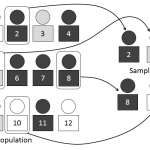Sampling > Extreme Case Sampling
What is Extreme Case Sampling?
 Extreme Case Sampling focuses on participants with unique or special characteristics. An extreme case (or deviant case) can be thought of as an outlier —an observation that takes on an extremely high or extremely low value. The general idea is that if you study extremes of the population, it could garner some valuable insights that can be generalized to the population as a whole. For example, if you were studying inner city violence, you could study a city with high violence and compare it to a city with low violence.
Extreme Case Sampling focuses on participants with unique or special characteristics. An extreme case (or deviant case) can be thought of as an outlier —an observation that takes on an extremely high or extremely low value. The general idea is that if you study extremes of the population, it could garner some valuable insights that can be generalized to the population as a whole. For example, if you were studying inner city violence, you could study a city with high violence and compare it to a city with low violence.
Like any sampling technique where a researcher deliberately chooses cases, extreme case sampling could result in selection bias, undermining results (Collier & Mahoney, 1996). Selection bias can largely be avoided if extreme cases from both ends of the spectrum are considered along with the general population as a whole.
Examples
- Angela Browne studied male victims of domestic violence for her book “When Battered Women Kill.”
- Kristen Monroe studied a variety of unusual altruists for her book “The Heart of Altruism.” They included a poetry editor who — armed with a cane — saved a young girl from being raped, and Otto Schindler, the German businessman who saved over a hundred Jews.
- Benjamin Reilly’s work on studying democracy and eloctoral systems focused on unusual societies like Papua New Guinea, a country of “exceptional ethnic fragmentation” which has thousands of ethnic “micropolities” speaking 840 languages.
- Frederic Deyo (1987) studied East Asian NICs (Newly Industrialized Countries), which stood “in stark contrast” to other Third World countries.
Quantifying Extreme Cases
Gerring (2006) defines extreme cases by their z-scores — although this only works with normally distributed cases. Cases with large World Politics. Vol 49, Issue 1. October, pp. 56-91.
Deyo, F. (Ed.) (1987). The Political Economy of the New Asian Industrialism. Cornell University Press.
Gerring, J. (2006). Case Study Research: Principles and Practice. Cambridge University PRess.
Monroe, K. (1996). The Heart of Altruism: Perceptions of a Common Humanity. Princeton University Press.
Reilly, B. (2000). Electoral Systems for Divided Societies. Retrieved 1/20/2017 from here: (https://devpolicy.crawford.anu.edu.au/pdf/staff/ben_reilly/ReillyB_04.pdf.)
Tendler (1997)